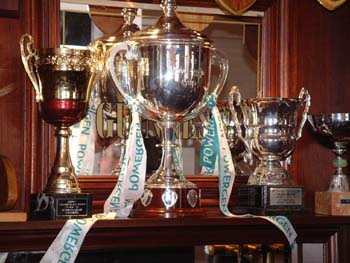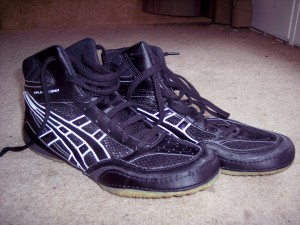
When Neil started wrestling two months ago at his high school, I was elated and optimistic. This, as I wrote previously, was something that he’d wanted for a very long time, and he made it happen. Surely that meant that this was the beginning of great things in his life, that this would be his niche, that by junior or senior year I’d be attending state championships and even nationals with him, filming him as he won matches, cheering, crying with joy that he achieved success on his own terms. I could see it happening. I could almost feel it. I wanted it for my son. But I knew that his first season would be a time of learning, since he hadn’t wrestled before, and I had talked with him about not feeling bad if he lost a lot of matches his first season. I told him that I had heard from other parents that their sons lost a lot of matches their first season, but they just kept practicing, and by their second season, they were winning matches.
The season is now two-thirds of the way over, and he has not lost any matches. But that’s because he hasn’t been in any matches. He hasn’t been in any tournaments. The only time he gets to actually wrestle is during practice. At least, that’s what I thought.
I picked him up from practice last week, as I usually do. He got in the car, I asked him how his day had been, and he said, “Fine,” as he usually does. I pulled out of the parking lot and began driving home. And then he said something that made me want to sob.
“I think there must be an odd number of people on the team, because whenever it’s time to pair up for practice, I always end up without a partner.”
He had said it with trust and diplomacy, without blame, and without self-pity. But I could hear his underlying disappointment. I could hear the frustration he’d learned to suppress from years – a lifetime – of being left out. Of not being understood. Not being accepted.
A few weeks ago, it was proposed by his case manager and the coach that we reduce his time at daily practice because he was complaining of being too tired to do his school work, and I had agreed. But I didn’t know that he was being excluded during practice, and I wondered how long it had been going on. I took a deep breath.
“Have you talked to the coach about it?” I asked. As much as I want to jump in and be mama bear, I am trying to hold back and give him the support to advocate for himself.
“Yes. But I don’t remember what he said.”
“Well, maybe you could talk to him about it again, and suggest to him that if there is an odd-numbered amount of people, that perhaps a few could rotate. Since you leave early, you could work with someone first, and then when you leave, the other person would get their turn.”
“Hey, that’s a good idea,” he said with interest. “I think that would work.”
*
Five days later, I ask Neil if he’d talked to the coach again, and if he’d been getting a partner at practice.
“Yes, for a little while,” he says. “But I’m starting to think that this being thrown around all the time is too hard on my body. Wrestling’s not how I thought it would be.”
This is new information, and part of me suspects that he’s trying to talk himself out of wrestling because he hasn’t been in any matches or tournaments. I remind him that the first season is a learning season for everyone, and ask him if he would like me to talk to the coach about making sure that he gets to do at least one match before the season is over. He declines my offer. I remind him that he’d been wanting to do this since he was a little kid.
“Yeah,” he says. “And I did it. I wanted to be on the high school wrestling team, and I am. That’s all I really wanted to do, besides inventing a time machine and being the first human on Mars.”
And it hits me – he just wanted to be on the team. That was his dream. Not finding his niche, or going to state championships or nationals – those were my dreams. And as long as he’s happy that he followed his dream, that’s all I really care about. I put my arm around him and tell him how proud I am of him. I ask him if he’d like to continue practicing the remaining four weeks of the season.
“No. I just don’t think wrestling’s my sport. It’s too painful. But I’m glad I tried it, despite the fact that it wasn’t what I thought it would be.”
I tell him that I’m glad that he tried it too, and then we go over what he should say when he calls the coach to tell him that he’s not going to do wrestling anymore. I remind Neil that he should tell the coach thank you for the opportunity to be on the team, and that it meant a lot to him.
It meant a lot to me, too.

